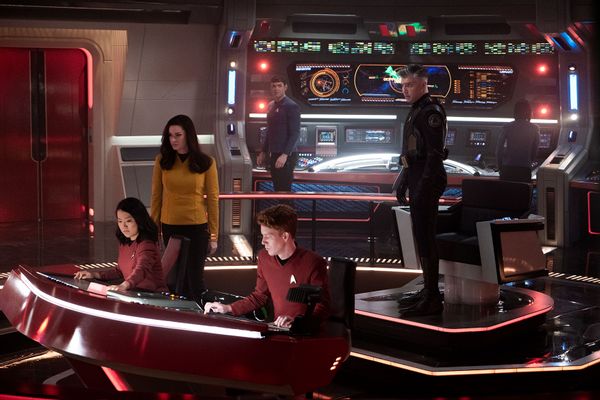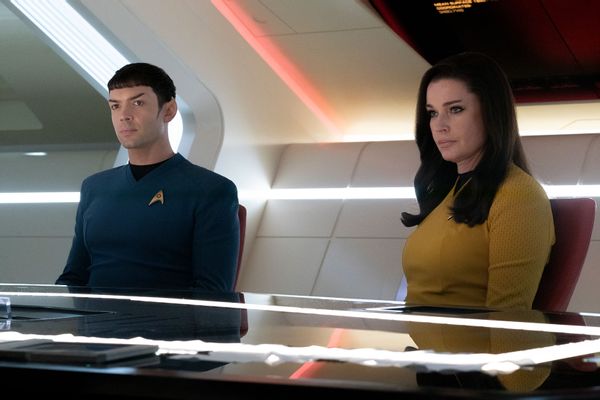
Each second-season episode of "Star Trek: Strange New Worlds" displays its awareness of history, whether that pertains to the franchise's lineage and the characters' places and roles within it or the overall tendencies and expectations we have of TV. That's a long way of explaining why each muscular swing was a surprise, particularly its musical episode "Subspace Rhapsody."
Broadway tributes are notoriously tricky for the best of shows, most of which get a few years under their belts before tossing those dice. "Strange New Worlds" mapped out its sophomore run and not only committed to a song-and-dance hour, but made it the season's penultimate episode.
That speaks to showrunners Akiva Goldsman and Henry Alonso Myers' confidence in the story and the audience's loyalty, certainly. It also acknowledges the industry's realities. While there isn't any viewership data to determine whether the show is a hit, Trek fans love "Strange New Worlds." Still, given the unpredictable state of TV right now, it could vanish tomorrow.
The undercurrent of "if not now, when?" driving its arcs makes sense, then. That attitude propelled the second season plots to invigorating destinations while doubling down on the emotional components that have enriched the overall journey.
It makes "Strange New Worlds" distinct from the original "Star Trek" and even "The Next Generation" by establishing it as the Trek that's unafraid to be in its feelings. And every relationship leap is a paving stone leading to its action-heavy finale, "Hegemony," and the U.S.S. Enterprise NCC-1701's crew's third deadly confrontation with the Gorn, a carnivorous reptilian species whose ships are tougher and deadlier than Starfleet's.
The Enterprise barely survive their initial run-ins with these predators in Season 1, and only because security officer La'an Noonien-Singh (Christina Chong) has firsthand knowledge of the Gorn as a rare survivor of one of their colony raids. But the second season premiere hinted that the show isn't finished with the Gorn when officials mention a worrisome gathering on the edge of Federation space.
Every hour between the premiere and finale fortifies our understanding of all the Enterprise crew stands to lose if the Gorn were to defeat them. That makes "Hegemony" more than another send-up of James Cameron's "Aliens" – although it recreates that classic's claustrophobic agita very well. The hour's higher function is in paying off this season's overt relationship focus, only to leave us in a frantic but delicious "To Be Continued . . ." limbo.
Cliffhangers are a polarizing device, which explains why the original series only uses it once – in "The Menagerie, Pt. 1," which officially introduces Pike to the "Trek" universe. (The character starred in the original and unaired "Star Trek" pilot.)
"Star Trek: The Next Generation" and other "Star Trek" spinoffs had a laxer attitude toward the gimmick and better reasons to employ it. "TNG" and "Deep Space Nine" were syndicated series, and in the age of scripted syndication, cliffhangers were insurance beckoning a wandering audience to return. Streaming series have abused that old ploy to the extent that it's both expected and lightly detested.

Pike is a profoundly empathetic leader who takes the most important missions personally. And he doesn't like to fail his people, which is different from failing a mission. This has been telegraphed from the series' start; Pike's foreknowledge of a terrible fate he can't avoid, one that will leave him lingering between life and death, informs his overall joie de vivre. He loves cooking for himself and his deck officers; he shows palpable despair when he loses someone; and he goes to extreme lengths to protect them.
At times he's barely able to mask his anguish or relief. When his Number One, Una Chin-Riley (Rebecca Romijn) returns to the ship following her exoneration, he breaks professional protocol by hugging her as if she nearly escaped death. (In a real way, she did – losing her trial would have killed her Starfleet career and reputation.)
Pike's emotive transparency makes him a great leader but, as the finale leaves open to debate, it may not make him the best captain to negotiate brinksmanship.
"Strange New Worlds" is far from singular in integrating its characters' vulnerabilities into its overall plot, but out of the franchise's recent series – aside from the third season of "Picard" – it is the most effective in persuasively presenting the Enterprises crewmembers' passions and abilities to empathize as assets instead of potential pitfalls.
A romance between Spock (Ethan Peck) and Nurse Chapel (Jess Bush) becomes a means for Spock to examine his humanity and a way of explaining why the version of the character Leonard Nimoy presents is nearly devoid of behavioral spikes. The ironclad loyalty that Chapel shares with Dr. Joseph M'Benga (Babs Olusanmokun) is explained in two episodes that reveal them to be veterans contending, with varying degrees of success, with post-traumatic stress disorder, as is La'an.
By having the stoic security officer taste a reality where she and Captain James T. Kirk (Paul Wesley) fall in love, only to lose him, we better appreciate the weight on her shoulders as she balances caring for her crew with remaining strategically detached.
As all this is happening, Pike confronts his shortcomings as a fully present partner for Marie Batel (Melanie Scrofano), the Captain of the U.S.S. Cayuga – the only Federation vessel orbiting an unaffiliated colony when the Gorn attack it.
Rewinding to "Subspace Rhapsody" for a moment, the central concern that episode galactic anomaly posed was that compelled sentient beings to sing private information about themselves to anyone who could hear, a premise the showrunners modeled on the bar-setting 2001 episode of "Buffy the Vampire Slayer" titled "Once More With Feeling."
As La'an points out to Pike, this presents a security concern for both the ship and Starfleet more broadly.
Presumably, she was talking about the possibility of an officer broadcasting tactical secrets, but as we see in "Hegemony" there's also danger in placing individual affections over the common good. Although Pike has orders from Starfleet not to cross the Gorn-established line of demarcation after destroying the Cayuga, the chance to save Captain Batel – and Chapel, who happened to be with Batel during her mission – is more important. So Pike forms a volunteer strike team that miraculously finds Batel and a few other survivors, including one plucky engineer named Montgomery Scott (Martin Quinn).

Worse, Marie reveals to Pike that she is infected, relegating her to a fate similar to the xenomorphs' human hosts in "Aliens."
As Pike is processing all this, more Gorn warships blink into orbit and turn on the Enterprise.
Trek timeline purists have already noted that incorporating this underutilized adversary into "Strange New World" contradicts a history established in the original series' "Arena" episode, where William Shatner's Captain Kirk describes his confrontation with a reptilian race as an instance of first contact.
Yes; also, who cares? "Strange New Worlds" has already demonstrated its facility with retconning messy time inconsistencies (in the episode "Tomorrow and Tomorrow and Tomorrow"), making this a piddly concern next to where we're left as the series goes dark for what could be a year.
Pike and the Enterprise survived the Gorn the first time by putting aside their fear and gambling with the ship's integrity, and the second, during an away mission confrontation, amplifying their fear and rage to draw out their monstrous younglings. "Hegemony" closes with the realization that not only is the ship overwhelmed, but so is its captain, and in large part because Pike and his crew heeded their humanity instead of strictly following orders.
And this presents the other side of the franchise's unspoken debate concerning the value and vulnerability of expressiveness in its captains, especially in the face of an enemy that lacks empathy.
There's no reason to lose too much sleep over this deep space Dunkirk since both we and Pike know that this incident won't be the one that kills him – or, for that matter, Spock, Uhura, Chapel, M'Benga, Number One or Scotty. In fact, it may be the reason Pike's birthday becomes an official holiday in the late 24th century – thank you, "Lower Decks" crossover episode!
The pain is in the waiting, for however long that may be, to see how "Strange New Worlds" wriggles the Enterprise out of this bind. That we feel such longing validates the writers' choice to more aggressively draw their bows across our heartstrings, allowing "Strange New Worlds" to maintain the course of its greatness – even as the Enterprise feels its way into trouble now and then.
All episodes of "Star Trek: Strange New Worlds" are streaming on Paramount +.







